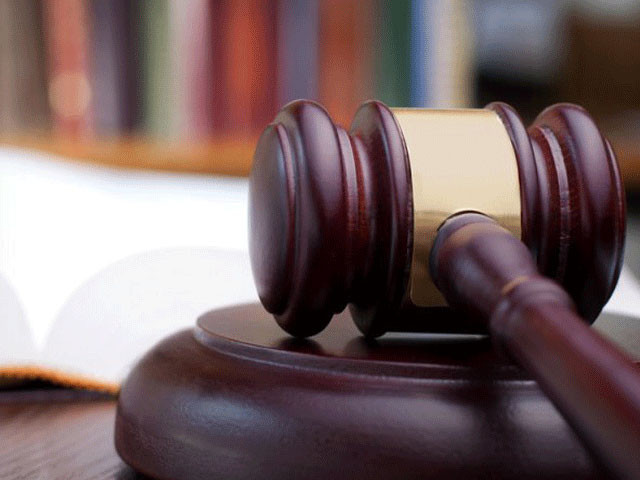Bandial questions maintainability of Isa petitions
Notes that SJC under Procedure of Inquiry, 2005 Rule can get material to form its opinion

PHOTO: FILE
The presidential moved in May last year accused Justice Isa of misconduct as he did not disclose his family members’ foreign assets in his wealth statement. Later, the Supreme Judicial Council (SJC), the constitutional body that can hold judges accountable, had started its inquiry on basis of the reference.
Justice Isa had accused the SJC led my former chief justice (CJ) Asif Saeed Khosa of biasness. He was also one of the petitioners to challenge proceeding of the SJC in the apex court whose ten-judge full court, headed by Justice Bandial resumed hearing of the case after a gap of one-month.
“We have to make Article 209 workable. When the proceeding against an SC judge [Justice Isa] has commenced and a notice is issued to him by the SJC then whether the present petition against the presidential reference will be maintainable,” he questioned.
Not a single page of proof provided against Justice Isa’
Interestingly Justice Bandial is now also a part of the SJC which was reconstituted after retirement of CJ Khosa in December last year. Justice Bandial has opted not to recuse himself from hearing Justice Qazi Faez Isa case in the Supreme Court.
Senior lawyers believe that it is left to a judge’s discretion whether he sits in a bench or recuses himself after becoming a member of the SJC. However, non-recusal of Justice Bandial is significant as the full-court members have already divergent view on the legal points raised by petitioner judge.
Justice Bandial is among those judges who during hearings of case have raised questions about maintainability of the petitions in view of Articles 211 and 248.
The full court has so far conducted 22 hearings of the case and Justice Isa’s counsels – Munir A Malik and Babar Sattar – have already concluded their arguments.
When bench resumed hearing of the case after one-month break, the Sindh High Court Bar Association’s counsel Raza Rabbani came to rostrum to argue the case.
Justice Gulzar Ahmed to replace Asif Saeed Khosa as new chief justice of Pakistan
He said when the hearing was adjourned last month, he was unsure as to whether a nine- or a ten- member bench will hear the case after the composition of the new SJC. However, he said, he is happy to see that the bench still comprises ten judges.
Rabbani, also former Senate chairman, contended that it is exclusive authority/mandate of the SJC to hold a judge accountable. There is wisdom behind giving exclusive power to the SJC for conducting inquiry which is also defined in Article 209 of the Constitution
He said the purpose of Article 209 is to ensure independence of judiciary. “If appointment/tenure of judges is secured under Article 175, then the mechanism for judges’ removal is also fully protected.”
Rabbani said the Constitution and the role of parliament cannot be de-linked whereas discretion of the president is also very limited which is also prescribed in the Constitution.
Sharing historical background of the Article 209, he read out excerpts from famous legal expert Abdul Hafeez Piraza’s speech in the parliament about insertion of the Article 209 in the Constitution of 1973.
The counsel, however, objected to the inquiry conducted against Justice Isa by the Federal Investigation Agency (FIA), the Federal Board of Revenue (FBR) and the Inter-Services Intelligence (ISI) etc, on the direction of the federal law minister and the Asset Recovery Unit (ARU) chairman.
“If state agencies like FIA, FBR, ISI etc started an inquiry against a judge, it would open a floodgate and there will be total chaos in the society,” he added.
Justice Faisal Arab, a member of the bench, asked him as to whether the president should file a reference without conducting an inquiry. Under the Constitution, he said, the SJC is bound to start an inquiry after a presidential reference is filed.
Justice Bandial agreeing with Rabbani’s contention said independence of the judiciary is a pillar of the Constitution and there is no independent judiciary without securing tenure of judges. He said removal of judges is an independent act; therefore, the president has to act independently.
The judge noted that under Procedure of Inquiry, 2005 Rule, the SJC can get further material to form its opinion to proceed against a judge.
Article 8 of Procedure of Inquiry, 2005 Rule says if the council is of the opinion that it requires more material or seeks additional information before it can form any opinion, it shall direct accordingly.
Hearing of the case was later adjourned till today (Tuesday).




1724319076-0/Untitled-design-(5)1724319076-0-208x130.webp)














COMMENTS
Comments are moderated and generally will be posted if they are on-topic and not abusive.
For more information, please see our Comments FAQ